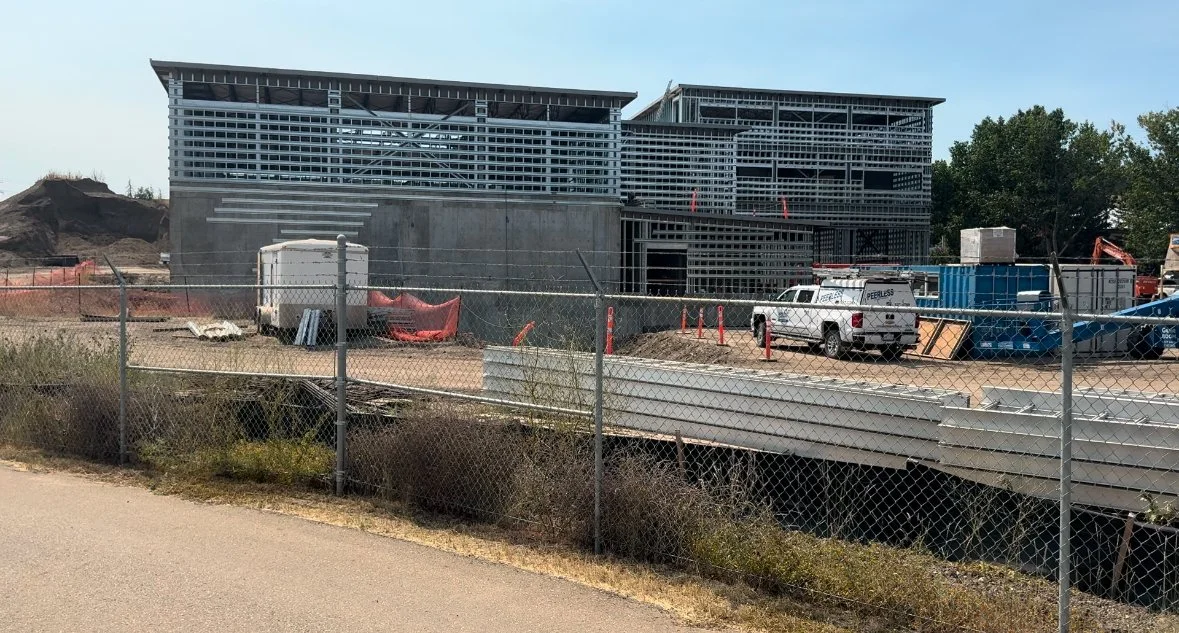City facing a $4M gap on water treatment plant
By Alex McCuaig
The city’s uncompleted residuals management facility.
Council will be getting a multi-million-dollar lump of coal in their stockings from an already over-budget and delayed project as they look to wrap up the city’s two-year financial plan before Christmas.
For the second time in a year, city administration will be seeking further funds to complete the new water treatment facility, this time seeking $4.1 million.
That amount comes on top of more than $3.8 million approved through a budget amendment in January.
Construction cost estimates have ballooned since 2022 from $26.5 million to $34.4 million, a more than 26 per cent rise over the originally budgeted cost. Those costs will be recouped by increased utility rates for water.
Both city administrators and a consultant commissioned to produce a report on overruns pointed to rising cost of materials as the primary reasons for the budget overages. However, city officials and the consultant’s report diverge on conclusions regarding a number of reasons for other budget increases.
Previous city councils had delayed upgrades to the city’s water treatment processing for years, initiating stop-gap measures to deal with increasing provincial regulations surrounding particulate matter discharges into the river system.
The project is also behind the originally provincially mandated completion date of Dec. 31, 2024, with the city being granted a one-year extension by Alberta Environment.
The originally budgeted $29.5 million project was funded primarily through provincial grants except for the initial $3 million coming from city coffers. Those city funds approved in 2018 were to cover pre-engineering and development costs.
The nearly $8 million in cost overruns, however, are being covered by city ratepayers.
The initial $26.5 million construction cost estimate was reviewed, confirmed and presented to Alberta government officials in June 2022 who subsequently approved to pay that amount through provincial grant funding.
But costs associated with the project have continued to rise.
City officials commissioned Brian Maksymetz, a consultant with Better Projects, to investigate cost overruns based on a review of the project conducted last month.
The initial multi-million-dollar request to cover budget overruns in January sparked a heated debate by city councillors. Council was told delays by Alberta Environment in approving the project delayed it by a year and resulted in added costs.
But Maksymetz’s consultant’s report released Friday highlights no specific delay by Alberta Environment’s regulatory approval process. The one exception is the report stated the ministry required the design of the water treatment facility be completed before it could be approved.
File photo of the residuals management facility from August 2024.
A “100% completed design” was presented to Alberta Environment in late 2022, according to the consultant’s report, which added, “we now know this was not a 100% completed design.”
Despite that, the ministry approved construction to commence in January 2023 following submission of a “completed” design in December 2022 by city officials.
During the January council meeting seeking a $3.8 million budget increase, Coun. Darren Hirsch outlined the city’s past reluctance to proceed with the project that would improve water quality on the South Saskatchewan River.
“We did our best to defer and to resist but certainly we got a mandate from the province to execute on this facility,” stated Hirsch at that meeting.
Other councillors also criticized the province for the increased costs.
The city’s initial construction timeline.
“It was their delay of a year which caused cost increases. Would we approach them to see if they would cover the cost difference due to the fact it was their delays which caused this issue,” asked Coun. Alison Van Dyke during the January 2024 council meeting.
Once informed the provincial grant provided is not flexible to cover cost overages, Van Dyke expressed disappointment.
“That again does not seem very fair to the citizens of the city to have to compensate for costs incurred due to the delay cause by the regulator,” she stated.
Coun. Robert Dumanowski also express frustration with the province not sharing the financial cost of budget overages.
“This is nothing less than trickle down costing back down to the municipalities yet again and my concern is we’re just accepting that,” he said during the January debate.
Dumanowski voted against the initial $3.8 million budget increase request despite being informed if the project wasn’t completed, the city could lose control of its water utility or face regulatory fines.
Regarding the water treatment plant’s actual completed design, Maksymetz went on to state in his report aspects of the project were still not fully developed this year or the year before.
“We know this because the bid packages for process mechanical and electrical were not ready until the summer of 2023 and because of the nature of many of the scope changes encountered in 2024,” read the report.
The report also stated that city officials knew in May, and possibly earlier, the $3.8 million requested just a few months prior wouldn’t be enough to complete the project.
Maksymetz will present his report to council on Dec. 16.





